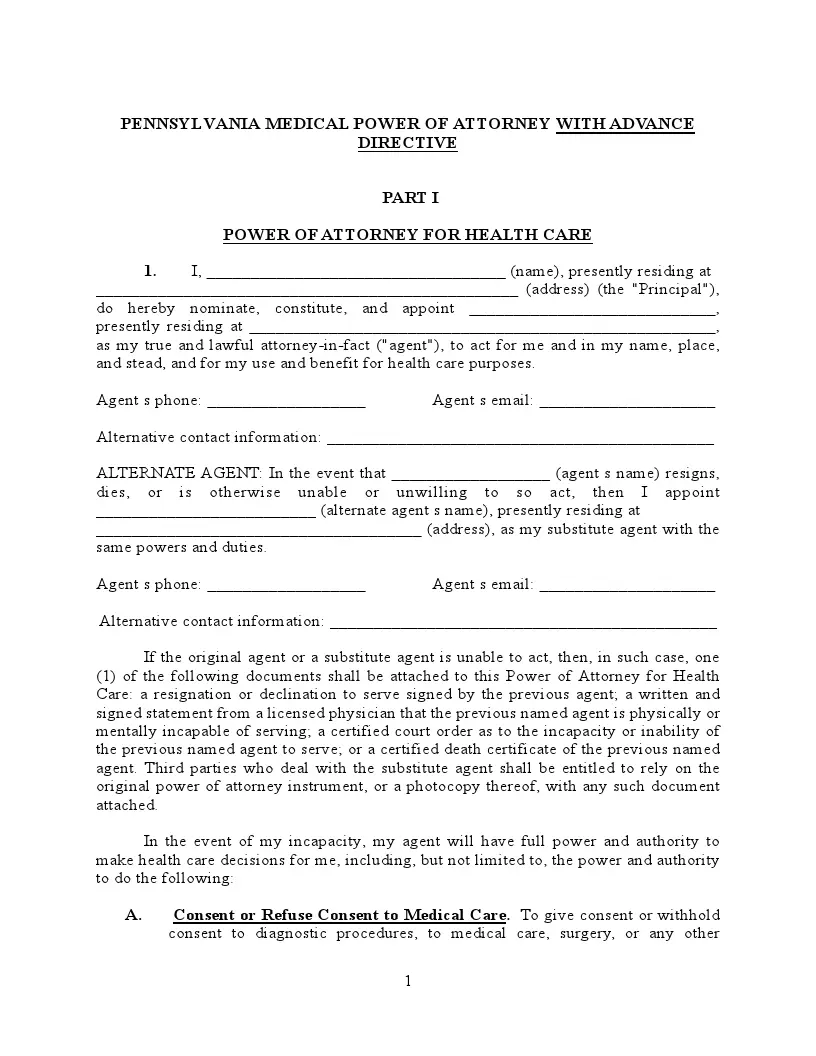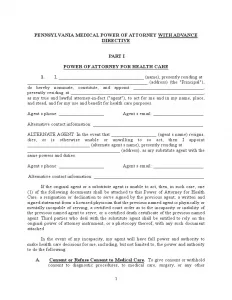Pennsylvania Medical Power of Attorney (POA) Form
The legal document entitled the Medical Power of Attorney is used to enable a specifically indicated person to take actions concerning the applicant’s health care and treatment on behalf of the applicant. The paper plays an important role in cases when the person is disabled to make such decisions on their own: due to a severe trauma, accident, their falling in a vegetative state, etc. What unites these cases is that a person cannot decide on their own future life and beyond.
Such a document can cease or continue health care treatment of the declarant, in the hands of a reliable agent or attorney who will act in favor of the declarant and according to their will described in the medical power of attorney form. It is strongly suggested that, for prevention of the situation when a person cannot act out of the disease or coma, the MDPOA form should be created beforehand. Such a practice is becoming widely spread throughout the United States these days.
The instructions usually included in the form are generally the following:
- General health care issues
- Medical treatment preferred
- Life-prolonging operations and care
- Any other instructions considered important by the applicant
Pennsylvania power of attorney forms – look into several other powers of attorney common in Pennsylvania.

Build Your Document
Answer a few simple questions to make your document in minutes
Save and Print
Save progress and finish on any device, download and print anytime
Sign and Use
Your valid, lawyer-approved document is ready
The Pennsylvania MDPOA Laws and Requirements
While in some states, the creation and validation of such a form may not require notarization or witnessing by a third party, other states’ laws may demand the conditions to be fulfilled. Pennsylvania is one of those states.
By the Pennsylvania General Assembly (Title 20, Chapter 54C, Sections from 5441 to 5447), the declarant is entitled to choose and assign up to two agents to take care of their healthcare-related business. You will need to insert the respective data on those two representatives, including their contact information and relationship type. These agents will get a legal right to decide on your life and health, so choose them wisely.
The declarant is also highly recommended to make some additional copies of the Pennsylvania Medical DPOA form for relevant local authorities that might require it. One (or two depending on the agents’ quantity) automatically goes to the agent, another goes to your physician (if applicable), and you can keep several others whom it may concern.
Pennsylvania Medical Power of Attorney Form Details
| Document Name | Pennsylvania Medical Power of Attorney Form |
| State Form Name | Pennsylvania Durable Health Care Power of Attorney |
| State Laws | Pennsylvania Consolidated Statutes, Title 20, Sections 5451 to 5465 |
| Signing Requirements | Two Witnesses |
| Who Can’t Be the Agent? | Section 5455(b) |
| Who Can’t Be the Witness? | Section 5452(c) |
| Avg. Time to Fill Out | 8 minutes |
| # of Fillable Fields | 21 |
| Available Formats | Adobe PDF |
Popular Local Medical POA Forms
MPOA templates are some of the most commonly used ones in the USA. The following are probably the most asked durable power of attorney papers.
Filling Out the Form
Hereunder, you will find a comprehensive guide on filling out the Pennsylvania Medical DPOA Form. Follow the recommendations below to provide accurate information.
1. Download the Template
First of all, you need to obtain the relevant version of the form. You can either download it from the official website or use our form-building software to customize the form template you need and fill it out online.
2. Add Your Data
In the first line of the form, a declarant should input their full name and the name of the country of your residentship.

3. Study the Information
Below you can see a text that contains the main information that concerns MDPOA and transferring special rights to the agent. These details are to be carefully read through in order to guarantee that in the end of the day, the wishes of the declarant are fulfilled to the utmost extent.
4. Fill out the Instructions for Your Agent
Here, you can designate the necessary instructions your assigned healthcare agent should act by when taking care of your business. Ensure to make the instructions as detailed as possible. This measure will help you avoid any misunderstandings or disputes in the future. The agent’s decision will concern your health directly, so take your time to fill this particular section out.

5. Choose Your Agent
Add the name of your agent and the type of relationship that ties you together. Below the name of this person, add his or her best phone numbers (work and home), one’s place of residence, and the mailing address.

6. Add Additional Agent
In Pennsylvania, two more agents can be appointed. You should input the information concerning those to enable them to substitute the primal agent should he or she falls disabled to bear the prescribed responsibility. As such cases are no rarity, appointing additional agents is only essential.
Apart from the telephone numbers, mailing, and home addresses, you also need to state the type of relationship that connects you with your agents.

7. Add Special Conditions
This section concerns your assigned agent directly. If you want to imply any kind of limitation onto their activity on your behalf. you can insert those restrictions in the blank section below.
8. Specify Info on the Donation and Burial Process
In these sections, you can choose whether you want to donate your organs (and which particularly) and in what way to be buried (if you want, of course). You can also add the names of people who you want to learn about your last wishes.
9. Insert the Information about Your Last Wishes
You are free to add some of your last wishes. For example, the name of the physician by whom you want to be treated or a particular medical place where you want to be in case of a serious illness.

10. Sign the MDPA Form
You, as a declarant, must check the information you have provided several times and then sign the document. If you are physically unable to do it, appoint a representative to sign the paper on your behalf. Ask the representative to insert details regarding their name, full address (information required in all sections in which the identity of a person must be specified).

11. Ask Two Witnesses to Sign
Two witnesses should sign, add the relevant data, birthdates, and their places of residence (with their cities and their states). Remember that none of your witnesses can act as your agent.

12. Ask a Notary to Sign (If Needed)
The same rule applies to the MDPOA form notarization in Pennsylvania: it is optional. But if you want to notarize your MDPOA form, there is a section for a notary to sign. The notarization makes the document gain more legal force. A notary should verify the document by signing, adding a signing date, state and county (where the procedure took place), one’s full legal name, the date when commission expires, and putting a seal (if applicable).

Here are various other Pennsylvania documents filled out by FormsPal users. Try our simple builder to personalize these forms to your requirements.
Download a Free Pennsylvania Medical Power of Attorney Form
